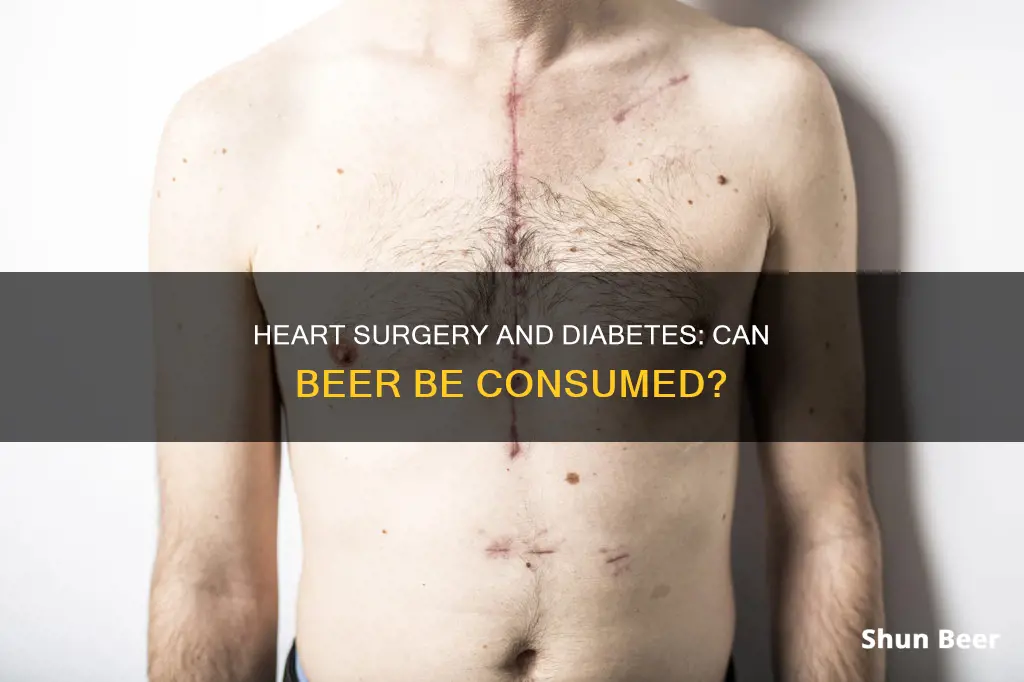
Drinking alcohol after heart surgery can be dangerous, as it may interfere with the effect of medications or increase blood pressure. It is therefore important to be honest with your doctor about your alcohol consumption, and to follow their advice. If you are permitted to drink alcohol, it is recommended that women do not have more than one drink per day, and men have no more than two.
For people with diabetes, drinking beer can cause fluctuations in blood sugar levels, as it contains sugar in the form of maltose or maltodextrin. Alcohol also contains calories, and can increase appetite, which can lead to overeating. For these reasons, people with diabetes need to be extremely careful when drinking beer. However, moderate drinking (no more than one to two drinks a day) may be beneficial for people with diabetes.
| Characteristics | Values |
|---|---|
| Can diabetic heart surgery patients drink beer? | Diabetic heart surgery patients can drink beer in moderation, but it is best to consult a doctor. |
| Recommended alcohol consumption for diabetic heart surgery patients | No more than one drink a day for women and up to two drinks a day for men. |
| Alcohol's effect on blood sugar levels | Alcohol can cause blood sugar levels to increase or decrease. |
| Alcohol's effect on blood pressure | Alcohol can increase blood pressure. |
| Alcohol's effect on medication | Alcohol may interfere with the effect of some medications. |
What You'll Learn

Diabetics drinking beer: blood sugar impact
Drinking alcohol can be a confusing topic for diabetics. While some sources suggest that moderate drinking may have benefits for diabetics, others caution that drinking and diabetes don't mix. So, what is the impact of drinking beer on blood sugar for diabetics?
Benefits of Moderate Drinking for Diabetics
According to some studies, moderate drinking may offer certain benefits for people with diabetes. These benefits include improved blood glucose (blood sugar) management and insulin sensitivity. Additionally, moderate drinkers tend to have lower A1C levels, indicating better long-term blood sugar control. However, it is important to note that this does not mean that non-drinkers should start drinking, as there may be other factors contributing to these improvements.
Risks of Drinking for Diabetics
On the other hand, drinking alcohol, especially in excess, can have several negative impacts on blood sugar control in diabetics. Here are some key risks to consider:
- Hypoglycemia: Alcohol interferes with the liver's ability to maintain blood glucose levels, especially when drinking on an empty stomach. This can lead to dangerously low blood sugar levels, known as hypoglycemia.
- Medication Interactions: Alcohol can interact with diabetes medications, particularly insulin and sulfonylureas, increasing the risk of hypoglycemia.
- Liver Function: The liver plays a crucial role in stabilizing blood glucose levels. However, when you drink alcohol, the liver prioritizes metabolizing alcohol over maintaining blood glucose, which can lead to hypoglycemia.
- Blood Pressure: Excessive alcohol consumption can increase blood pressure, which is a risk factor for cardiovascular disease.
- Nutrition and Calories: Alcoholic drinks, especially high-carb options, can contribute to an increased calorie intake and weight gain.
- Diabetes Complications: Heavy drinking can worsen diabetes-related complications such as disturbances in fat metabolism, nerve damage, and eye disease.
Recommendations for Diabetics
When it comes to drinking beer or other alcoholic beverages, it is essential for diabetics to follow certain recommendations to minimize risks:
- Always consult your doctor about your drinking habits and get personalized advice.
- If you choose to drink, stick to moderate consumption: no more than one drink per day for women and up to two drinks per day for men.
- Avoid drinking on an empty stomach. Have food with your drink to prevent hypoglycemia.
- Keep an eye on your blood sugar levels while drinking and up to 24 hours after drinking.
- Stay hydrated by drinking plenty of water along with your alcoholic beverages.
- Choose lower-carb and lower-alcohol options, such as "light" beers.
- Do not drink if you are pregnant, underage, or have other medical conditions like liver or kidney disease.
In conclusion, while moderate drinking may offer some benefits for diabetics, it is crucial to be aware of the potential risks and follow recommended guidelines to minimize negative impacts on blood sugar control. As always, consult your doctor for personalized advice regarding alcohol consumption.
Beer and Kidney Cysts: What's Safe to Drink?
You may want to see also

Alcohol and medication interactions
Alcohol interacts with many medications, and it is important to be aware of these interactions to avoid adverse health consequences. Here are some key points about alcohol and medication interactions:
- Blood Pressure Medication: Alcohol can interfere with blood pressure medications. As alcohol is often consumed socially, it is easy to forget that it is a depressant and can lower inhibitions, leading to increased blood pressure and heart rate. This effect may be more pronounced in individuals with existing heart conditions or high blood pressure. It is crucial to consult a doctor or healthcare provider about alcohol consumption if you are taking any blood pressure medication.
- Diabetes Medication: Alcohol can have a significant impact on blood sugar levels, especially for people with diabetes. Alcohol interferes with the liver's ability to produce glucose, and when combined with insulin or other diabetes medications, it can lead to dangerously low blood sugar levels (hypoglycemia). Diabetic patients must closely monitor their blood sugar levels when consuming alcohol and ensure they do not drink on an empty stomach.
- Pain Medication and Sedatives: Mixing alcohol with pain medication or sedatives is strongly discouraged. Alcohol enhances the effects of these medications, increasing the risk of adverse side effects, including respiratory depression, impaired motor control, and loss of consciousness. It is essential to follow the instructions provided by your doctor or pharmacist regarding the consumption of alcohol while taking these medications.
- Heart Medication: For individuals with heart conditions, alcohol can interact with certain heart medications. For example, alcohol may increase the effects of blood thinners, raising the risk of bleeding. Additionally, alcohol can negatively affect heart health, increasing the likelihood of cardiovascular events and mortality, especially in excessive or binge drinking. It is crucial to discuss alcohol consumption with your doctor or healthcare provider if you have a heart condition.
- Mental Health Medication: Alcohol can interact with various medications used to treat mental health conditions, such as antidepressants and anti-anxiety medications. These interactions can lead to increased sedation, impaired motor control, and altered mental status. It may also reduce the effectiveness of these medications. It is important to consult a healthcare professional before consuming alcohol while taking any mental health medication.
- Liver and Kidney Medication: Alcohol can be particularly harmful to individuals with liver or kidney disease. It can interfere with the absorption and effectiveness of medications for these conditions and further damage the organs. If you have liver or kidney disease, it is generally recommended to abstain from alcohol or, at the very least, consult your doctor about safe consumption limits.
Beer and Pregnancy: Is One Drink Safe?
You may want to see also

Recommended alcohol intake for diabetics
If you have diabetes, drinking alcohol may be safe for you as long as you choose the right types of drinks and consider alcohol’s effects on your blood sugar levels. It is important to note that diabetes causes lower-than-normal production or function of insulin, the hormone that helps control your blood sugar levels, so blood sugar management is crucial.
According to the 2020–2025 Dietary Guidelines for Americans, moderate alcohol intake is defined as up to one drink per day for women and up to two drinks per day for men. One drink is equivalent to 12 fluid ounces (360 mL) of regular beer (5% alcohol), 5 fluid ounces (150 mL) of wine (12% alcohol), or 1.5 fluid ounces (45 mL) of 80-proof distilled spirits (40% alcohol).
- Avoid low-sugar or low-alcohol beverages: Drinks labelled as low-sugar or low-alcohol, such as low-sugar beers and ciders or low-alcohol wines, often contain more alcohol or sugar than their regular counterparts.
- Choose low-carb options: Opt for low-carb beers, such as Miller Lite, Coors Light, or Bud Lite, which have fewer carbohydrates and calories than regular beers.
- Opt for distilled spirits or hard liquors: Gin, rum, vodka, and whiskey contain zero grams of carbohydrates per serving. However, be cautious when mixing liquor with sugary juices or sodas, as this can cause a spike in blood sugar levels.
- Consider red wine: Among all types of wine, red wine is linked to the most health benefits for diabetics due to its high antioxidant content. It may improve heart disease markers and reduce the risk of diabetes-related complications.
- Monitor your blood sugar: Regularly check your blood sugar levels before, during, and after drinking, especially if you take diabetes medications, as alcohol can interfere with their effects.
- Eat before drinking: Drinking on an empty stomach can increase the risk of hypoglycemia, as your liver struggles to maintain basal blood sugar levels while metabolizing alcohol.
- Be mindful of calories: Alcoholic drinks can be high in calories, which can hinder weight loss or management.
- Discuss with your healthcare team: Consult your healthcare providers about your alcohol consumption, especially if you take diabetes medications, to ensure safe drinking practices and avoid complications.
It is important to note that while moderate alcohol consumption may offer some benefits, excessive alcohol intake is associated with an increased risk of type 2 diabetes and various health complications. Additionally, alcohol can interfere with the effects of certain medications and affect your recovery process if you are scheduled for heart surgery. Therefore, it is crucial to be honest with your healthcare providers about your alcohol use and always follow their recommendations.
Mixing Beer and Cough Syrup: What You Should Know
You may want to see also

Alcohol and diabetes: calories and weight gain
Alcoholic drinks are often high in calories and can affect hormones that control appetite, hunger, and stress. These factors can contribute to weight gain, especially if you drink in excess. However, research suggests that light-to-moderate alcohol consumption does not cause weight gain.
How alcohol affects weight and body composition
Alcoholic drinks are usually high in "empty calories", meaning they contain little to no beneficial nutrients or minerals. A gram of alcohol provides 7.1 calories (29 kilojoules), and studies show that energy from alcohol is additive to that from other dietary sources. This can promote a positive energy balance and, ultimately, weight gain.
Drinking alcohol can also impair the functions of glands that release hormones, which may cause weight gain. For example, heavy drinking may cause your adrenal glands not to regulate how much cortisol they secrete, leading to high cortisol levels. Elevated cortisol levels may increase abdominal weight gain and cravings for high-calorie foods.
Alcohol and diabetes
Alcohol can affect people with diabetes in several ways. Firstly, it can reduce your blood sugar level, which may increase hunger. People with diabetes may need to be cautious with alcohol as drinking, especially on an empty stomach, may cause low blood sugar. Secondly, alcohol is high in calories and likely to increase abdominal fat. This is a concern for people with diabetes as abdominal fat is linked to several health complications.
Managing alcohol intake
If you want to manage your weight, you do not have to give up alcohol entirely. According to the Dietary Guidelines for Americans, it is recommended that you drink in moderation, which is at most one drink per day for women and two for men. Opt for low-calorie, low-alcohol drinks, and ensure you eat a meal before drinking.
Beer and Tramadol: A Safe Mix?
You may want to see also

Alcohol withdrawal after heart surgery
If you drink more than three alcoholic drinks per day, you may experience alcohol withdrawal after heart surgery. Alcohol withdrawal is a set of symptoms that occur when someone who has been drinking alcohol long-term suddenly stops drinking. The central nervous system "overreacts", which can cause mild shakiness, sweating, hallucinations, and other more serious side effects.
Untreated alcohol withdrawal can lead to life-threatening complications, including tremors, seizures, delirium tremens, and even death. It can also result in a longer hospital stay in the intensive care unit (ICU) and interfere with organ systems and biochemical controls in the body.
To avoid these risks, it is important to be honest with your healthcare providers about your alcohol use before heart surgery. They can offer alcohol withdrawal treatment prior to surgery to reduce the risk of post-operative seizures, delirium tremens, and other complications.
- Honesty with Healthcare Providers: During your pre-surgical visits, be honest about your alcohol consumption. This information will help your healthcare team assess your risk of alcohol withdrawal and provide appropriate treatment.
- Alcohol Withdrawal Treatment: If you are at risk, your healthcare providers can offer treatment before surgery to reduce the likelihood and severity of withdrawal symptoms.
- Potential Complications: Untreated alcohol withdrawal can lead to serious complications, including tremors, seizures, hallucinations, and even death. It can also prolong your hospital stay and require intensive care.
- Impact on Surgery Outcome: Excessive alcohol use, defined as more than three drinks per day, can negatively affect the outcome of heart surgery. Binge drinking can also impact surgical outcomes.
- Post-Surgery Alcohol Consumption: After surgery, always consult your doctor about alcohol consumption. Alcohol can interfere with medications and increase blood pressure. If permitted, women should not exceed one drink per day, and men should not exceed two.
Beer Hair Wash: Does it Work?
You may want to see also







